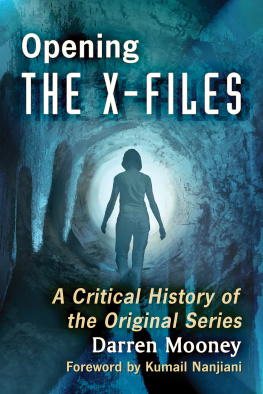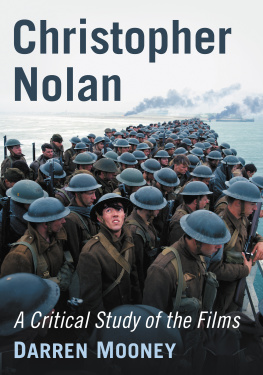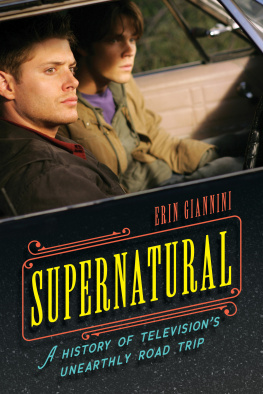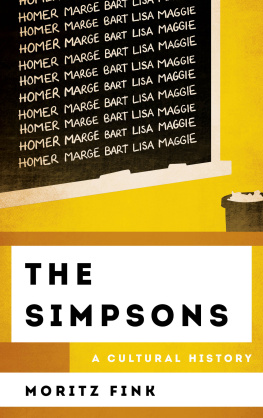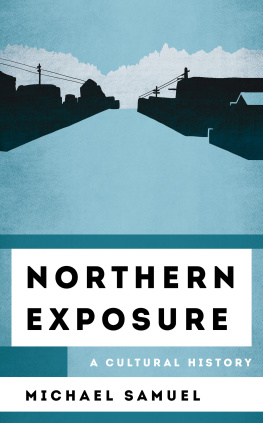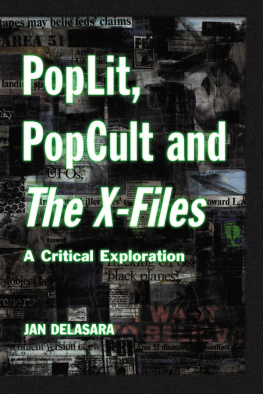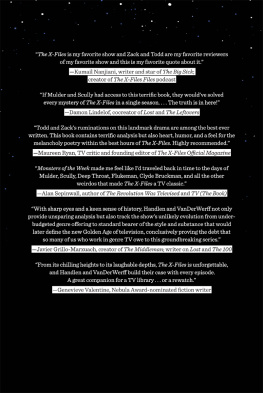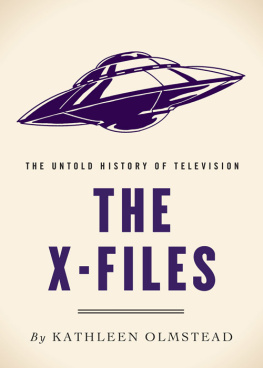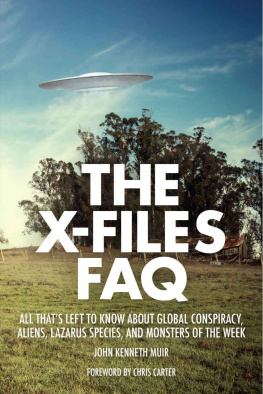
Opening The X-Files
A Critical History of the Original Series
Darren Mooney
Foreword by Kumail Nanjiani

McFarland & Company, Inc., Publishers
Jefferson, North Carolina
LIBRARY OF CONGRESS CATALOGUING DATA ARE AVAILABLE
BRITISH LIBRARY CATALOGUING DATA ARE AVAILABLE
e-ISBN: 978-1-4766-2880-6
2017 Darren Mooney. All rights reserved
No part of this book may be reproduced or transmitted in any form or by any means, electronic or mechanical, including photocopying or recording, or by any information storage and retrieval system, without permission in writing from the publisher.
Front cover image 2017 Serg Myshkovsky/mangojuicy/iStock
McFarland & Company, Inc., Publishers
Box 611, Jefferson, North Carolina 28640
www.mcfarlandpub.com
Acknowledgments
There are too many people who have contributed to this project in countless ways to mention them all, and it is entirely possible that some of them may be left out due to my own absent-mindedness.
Thank you
to those who read this book (including this page) and to those who followed the idea in its infancy as a blog project.
to the fans who came before me. Credit is due to the critics whose insight guided and shaped my own readings, including Sarah Stegall, Paula Vitaris, Zack Handlen, and Todd VanDerWerff. The fans have done an incredible job archiving supporting material for posterity. Particular sites, including Eat the Corn and Back to Frank Black, have made researching a project like this much better than it would otherwise be.
to Kumail Nanjiani, not only for the entertainment and insight he provides on The X-Files Files, but also for crediting my work and helping me reach a larger audience. I was incredibly flattered when he accepted the invitation to write the foreword to this book.
and, finally, to those who worked on the show itself. Some were kind enough to offer insight and guidance on the project, or even to correct the occasional misreading or misattribution. The production team who worked on The X-Files have been extremely gracious with their time and attention to fandom. They created one of the most compelling and insightful television shows of the 1990s, capturing a moment of the national consciousness in amber, and helped to shape and define modern television.
Foreword
by Kumail Nanjiani
The X-Files is my favorite TV show of all time. Watching these two FBI agents investigate the paranormal while sitting in my house in Pakistan made the world seem bigger, stranger, cooler. Ive watched the entire series three times, and am currently on my fourth rewatch. I did so because I decided to host a podcast called The X-Files Files, wherein I discuss, chronologically, every episode of the show.
This is where Darren Mooney comes in.
I found Darrens reviews while doing research online. Id watch an episode, read a ton of reviews, making sure I didnt miss any analysis. And Id cite reviewers I thought added to my understanding of the episode. Over and over, I found myself citing the same person: Darren Mooney. I found his analysis of each episode to be thoughtful, thoroughly researched, and entertaining. Id read his reviews and say, Oh I hadnt thought of that, almost every time. He wasnt just talking about what he liked and what he didnt like. He was articulating exactly what it was about each episode that made it successful or unsuccessful. He was situating specific references in specific historical contexts. Did you know F. Emasculata aired in a period where the U.S. was paranoid about infection due to the Ebola virus? Or that the mythology was based on the idea that most of the countrys modern sins could be traced back to the end of the Second World War? See? Even in the foreword to his book, Im quoting him.
So, Darren was an invaluable resource for my podcast, and, more than that, he made me see the show in a new light. I started to understand the recurring themes of the show: loss of innocence, cynicism, globalization, obsession with the past. I started to see the show less as individual episodes and as a more cohesive whole. And then something happened that I could never have anticipated: I loved the show even more. On my fourth rewatch, I was finding things I had never found before. And I owe all that to Darren Mooney and his thoughtful analysis and critiques.
So, stop reading this foreword. Watch the pilot, then read Darrens piece on it. Then watch the next episode, and read his piece on that. Continue until you are done. I am halfway through season four right now. And I know I get excited about watching the episodes, but I get just as excited about reading Darren afterward.
Kumail Nanjiani is a comedian, writer and actor who has been seen on Portandia, The X-Files, and is currently a regular on Silicon Valley.
Preface
What does a decade look like?
If you want to know, just turn on television. One of the defining features of television is the immediacy of the medium.
This is perhaps demonstrated in the emphasis on live programming throughout the long history of the medium; from the sports broadcasts that have been a fixture since the live broadcast of a match between Arsenal and the Arsenal Reserves on the BBC on September 16, 1937, through to modern-day talent competitions boasting live phone polls to determine which contestants will get through.
Discussing the potential of the young medium in May 1937, cultural critic Gilbert Seldes predicted that the telecasting of events directly from their scene of action, [would] eventually form the staple of the television program.
Although television largely moved away from live drama, except for special events,
Film enjoys a more relaxed production-and-release schedule. It is not uncommon for the development of a film to take years from initial concept to final release. Film allows greater opportunity for post-production and even time for reshoots; release dates can be pulled forward or moved back to accommodate behind-the-scenes changes. Of course, there are all manner of time-related pressures bearing down on film production, but the medium is generally more relaxed than that of television.
Television has a much faster production turnaround time. Although the trend has been towards fewer episodes of limited series, television production is generally driven by tighter deadlines and more limited resources than film. Shooting an hour-long drama can take anywhere from five to six days, with some commentators likening the process of television drama production to a conveyor belt. The demands of the industry are such that episodes must be delivered on time, with less flexibility in scheduling.
This urgency is perhaps one of the reasons twentieth-century television struggled to attain the same level of critical respect afforded to other media. Although the rise in prestige cable broadcasting at the turn of the millennium, and its influence on network programming, has shifted the perception somewhat, a lot of twentieth-century television was treated as disposable entertainment. It was little wonder that Newton N. Minow, chair of the Federal Communications Commission, infamously described television as a vast wasteland.
The assembly-line production process likely contributed to this, with many critics and commentators suggesting that true artistry does not march to a factory beat; inspiration cannot be turned on and off like a faucet, with the production of television drama arguably resembling more of a churn than a purer creative process.
Next page
